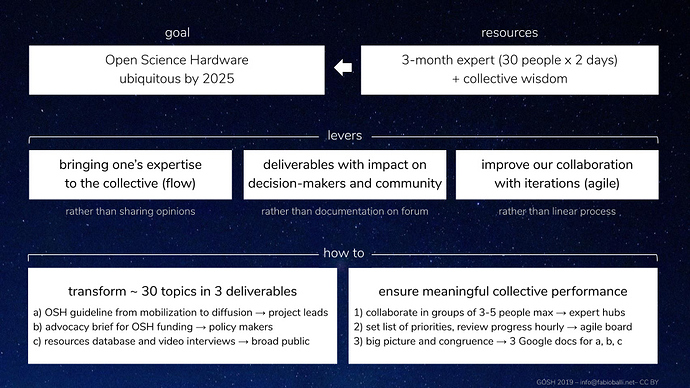Dear peers,
Following my experience of GOSH 2019 (image below and thread), I would like to invite you to consider a new way of collaborating for future events.
It is indeed not enough to let contents emerge from participants. The time structure of the events should also be discussed and agreed by the participants as one voice.
Concretely, for the organizers that means:
-
share the goals you have for the event, possible activities (Vision contract), and how to readjust (Mission A contract)
-
leave the room and let the participants collectively define how to best reach the goals with their resources (Cooperation contract), and how to readjust (Mission B contract)
-
come back, hear the participants’ collective proposal and ensure they all agree on it, otherwise go back to 2
-
if the proposal fits the Vision contract, implement, otherwise share the additional constraints that the group has to take into account and go back to 2
-
readjust the collaboration as defined (mission A/B contract)
Step 2 ensures that participants get recognition from each other. If the authority stays in the room, participants will then search recognition from it at the expense of their peers, and the group will remain weak and inefficient – whether in a company or a volunteer group.
The first adjustment will probably take a few hours, but will highly increase the following collaboration (knowing where to hammer nail).
Another way to foster this adjustment while keeping a time structure thought for participants instead of with them is to do a round of feedback at least once a day, where everyone express and share their feelings. This can be done for example by sharing one’s level of energy (from -3 to +3) and say a few words (meteo). No feedback on contents during this time!
Such regulation allows the group to acknowledge the individual experiences and needs, and adjust accordingly. The circle is a key ritual to build belonging and intimacy. Participants should be encouraged to speak freely in a circle, each circle allowing more authenticity.
I lived this method many times and never saw an approach that has half its impact. I hope this proposal can inspire you to experiment this approach too.
May OSH be ubiquitous. 

